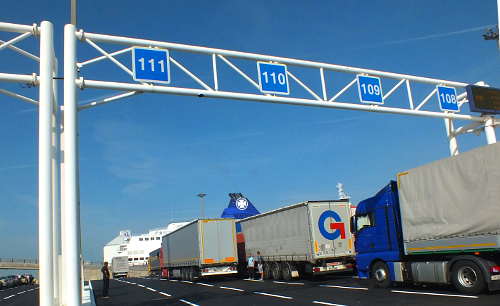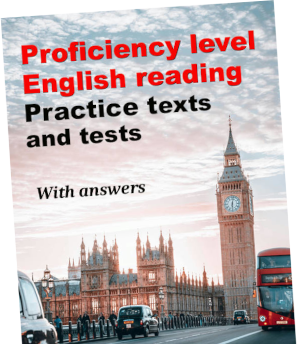Advanced level English - Britain
BRITAIN- at any cost ?
Advanced EFL reading resource
Now with IELTS-type reading comprehension test. In November 2019 police
in the east of London made a gruesome
discovery in the back of an abandoned refrigerated lorry that had come
off a ferry from Zeebrugge, in Belgium. Instead of the expected cargo
of perishable goods, officials found the bodies of 39 men and women
who had been trying to enter Britain illegally.
In November 2019 police
in the east of London made a gruesome
discovery in the back of an abandoned refrigerated lorry that had come
off a ferry from Zeebrugge, in Belgium. Instead of the expected cargo
of perishable goods, officials found the bodies of 39 men and women
who had been trying to enter Britain illegally.For these thirty-nine, death in the back of an airless sealed truck was the ultimate price they paid for a journey that took them half way round the world, from villages in Viet-Nam, to the destination they were so keen to reach; Britain.
This was not the first lorry of death to have been discovered in Britain; nor the worst. The worst was in June 2000 when 58 bodies were discovered by customs in the back of a truck that had just arrived in Dover. These were men and women who had come from China, hoping to find a better life in the UK. Others have drowned while trying to cross the English Channel in small boats.
The British dream
In spite of its problems - in spite of Brexit, in spite of its congested cities, its climate, its understaffed hospitals, and the poor conditions in the socially-deprived areas of certain cities – there is an image of liberal Britain that shines like an Eldorado, a land of milk and honey, a land of opportunity, where the people are all rich and welcoming. It is an image that is popular in the imaginations of millions of men, women and children living in poor or repressive countries all over the world.In addition, many imagine that Britain is a country where they will be easily understood, given that millions of people all over the world, even in poor countries, have learned enough English to get by with. They also believe that it is easy to avoid being caught in Britain, as people in the UK do not carry identity cards.
Britain is seen as a land of prosperity, a land of freedom and fairness, a land of hope and opportunity, and a land which is reputed to be more hospitable than most to stateless homeless refugees arriving across its borders. And up to a point, the image that these would-be immigrants have of the United Kingdom is based on fact, even if it is exaggerated fact.
The reality
The reality is rather different. There are lots of jobs in Britain… there are plenty of good jobs that are well paid; but while many people in Britain enjoy a very good lifestyle… there are many more who hardly earn enough to live on, and the number of people in the UK living in poverty keeps rising. Many illegal immigrants, even refugees, end up living in poor conditions, hiding from the police, doing unpleasant work, and earning much less than they imagined. Illegal immigrants have to take what jobs they can find, often hard jobs that are paid below minimum wage.... and there are plenty who are willing to exploit them. Once they discover the reality, many who have entered Britain illegally wish they had not come.While the vast majority of people in Britain remain tolerant and are not racist, there has been an increase in racism and intolerance in Britain, most notably since the Brexit referendum
The men and women who suffocated to death in that truck back in 2019 all thought that knew where they were going, knew what to expect; and they had paid a lot of money for the journey. In reality, they were victims of their credulity.
Among the reasons that had encouraged them to make the journey were glowing reports sent back home by others who - apparently - had made the journey before them. But in the post-truth age, unverfied recommendations must never be taken at face value.
The people-traffickers
Some of those who encourage others to come are paid, or forced, to write fake reviews promoting the services of the people-smugglers, unscrupulous dream merchants who make piles of money organising illegal and dangerous passages to Britain.Now that it is much easier to get right across Europe by truck or by train or by plane, travelling from Asia to Europe has become far faster, and people-trafficking has become a very lucrative business. Criminal gangs in Asia, Russia Europe and the UK have been competing to set up illegal trade and trafficking networks that can bring them in a lot of money from selling forged or stolen documents or smuggling people into Europe and in particular into Britain. Since 2018, traffickers have been using a new and highly dangerous way of sending people illegally to the UK – small-boats. Hundreds of prospective immigrants, including babies and children, have drowned in the cold waters of the English Channel, after getting into trouble in overcrowded flimsy rubber Zodiacs. That is the reality of people smuggling in the twenty twenties; but the traffickers don't care; for them it's good business, the profits can be enormous, and the risks of getting caught are not high.
An insoluble issue
As long as the gulf between rich countries and poor countries remains as great as it is today, and as long as repressive regimes hold sway in many parts of the world, there will always be enormous pressure for dynamic or desperate people to flee poverty or repression and to try and reach a richer country, where they suppose they will enjoy a better standard of living, and far better social conditions. Given that the difference in living standards between the richest and the poorest countries of the world is growing all the time, not shrinking, some of them will be right, so it seems unlikely that the flow of immigrants towards richer countries will decline.In many ways, the problem of illegal immigration from poor countries to rich ones is insoluble . The image of the good life in western countries is projected worldwide by the media, in the movies and on the Internet. As long as there is money to be made from poor people who dream, the criminal gangs who trade in human beings will keep trying to smuggle people in the backs of lorries or pack them like sardines into dangerously overloaded small boats. And as long as the dream is promoted, people will keep on trying, by any means they can think of, to make their way to Western Europe, and often, preferably, to Britain where they understand the language.
Many dream of a better life; many dream that “the grass is greener on the far side of the hill" – and sometime it is. But some never even reach the far side of the hill, and for others the grass they find on arrival is not green at all..
.
borders - frontier - congested: very full - customs: people who check goods at international borders - fairness: justice - forged: false, counterfeit - gulf: gap, divide - lucrative: profitable - sealed: shut - smuggle: move illegally - suffocated - die from lack of oxygen - trade: commerce - ultimate: final and maximum - unscrupulous: without morals - -
Copyright © Linguapress 2020 updated 2025 . Do not copy this document to any other website
Copying permitted for personal study, or by teachers for use with their students
WORKSHEET
See also separate ► IELTS-type reading comprehension test.Britain - at any cost ?
Worksheet :Words and meaning -
Find the words in the,article which have the meaning of :- macabre, very unpleasant
- died in the water
- to be able to understand and be understood
- friendly, welcoming, good towards people from other places
- potential, hoping-to become
- very positive, very favourable
- sending people back to their home country
- concern, worry, disturb
- getting smaller,
- impossible to answer
Oral or written comprehension questions:
Answer these questions coherently, and in a form that corresponds to the way in which the question is asked:
1. What was the "gruesome discovery" made
by the police in London?
2. What had they expected to find?
3. Who were the victims of this tragedy, and why were they in the lorry?
4. What disadvantages of life in Britain are many immigrants willing to overlook?
5. Why does Britain seem particularly attractive for many people in developing countries ?
6. How do they see Britain?
7. Why do illegal immigrants find it easy to escape detection in Britain?
8. Why has the flow of immigrants increased in recent years?
9. What are people traffickers, and how do they operate?
10. Why is illegal immigration likely to remain a big issue in the years to come?
2. What had they expected to find?
3. Who were the victims of this tragedy, and why were they in the lorry?
4. What disadvantages of life in Britain are many immigrants willing to overlook?
5. Why does Britain seem particularly attractive for many people in developing countries ?
6. How do they see Britain?
7. Why do illegal immigrants find it easy to escape detection in Britain?
8. Why has the flow of immigrants increased in recent years?
9. What are people traffickers, and how do they operate?
10. Why is illegal immigration likely to remain a big issue in the years to come?
Ideas for teachers :
Grammar :
Negation:Have students look, in this article, for all the different ways in which negation is stated or implied.
The use of not is just one of them....
Others include: a) Instead of (this conjunction implies that an action did not take place)
b) the ending -less (as in stateless, homeless etc.).
c) the prefixes un- and in- (as in illegal, unpleasant, intolerance, unscrupulous etc. )
d) the word no followed by a noun (as in there is no grass.)
For more on negation, with lots of examples, see Linguapress grammar : Negatives in English on this website, or as a paperback for your class or school library.
Quantifiers
Have students pick out all the different quantifiers used in the section "The Reality"
For more on quantifiers, see Linguapress grammar : Quantifiers
Language:
word families. a) Have students pick out, in the text, the nouns that correspond to the following verbs: alternatively, go through this list, once you have finished studying the text in class, to check that words are correctly remembered.
discover, immigrate, die, imagine, hope, report, not tolerate, repress, detect, identify, contact, increase, process.
b) And what about the nouns from these adjectives? prosperous, poor, free, fair, official.
Class discussion:
Most developed nations have strict laws as far as immigration is concerned: is this right? Why do they have these rules? Could they do without them? What are the arguments for and against? This topic should be able to lead to an interesting discussion.
© linguapress.com





 Copyright
information.
Copyright
information.